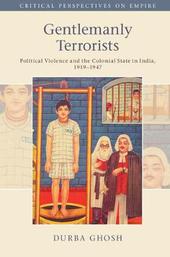
|
Gentlemanly Terrorists: Political Violence and the Colonial State in India, 1919-1947
Hardback
Main Details
| Title |
Gentlemanly Terrorists: Political Violence and the Colonial State in India, 1919-1947
|
| Authors and Contributors |
By (author) Durba Ghosh
|
| Series | Critical Perspectives on Empire |
|---|
| Physical Properties |
| Format:Hardback | | Pages:290 | | Dimensions(mm): Height 235,Width 158 |
|
| Category/Genre | Asian and Middle Eastern history |
|---|
| ISBN/Barcode |
9781107186668
|
| Classifications | Dewey:954.03 |
|---|
| Audience | | Professional & Vocational | |
|---|
| Illustrations |
Worked examples or Exercises; 6 Halftones, black and white
|
|
Publishing Details |
| Publisher |
Cambridge University Press
|
| Imprint |
Cambridge University Press
|
| Publication Date |
20 July 2017 |
| Publication Country |
United Kingdom
|
Description
In Gentlemanly Terrorists, Durba Ghosh uncovers the critical place of revolutionary terrorism in the colonial and postcolonial history of modern India. She reveals how so-called 'Bhadralok dacoits' used assassinations, bomb attacks, and armed robberies to accelerate the departure of the British from India and how, in response, the colonial government effectively declared a state of emergency, suspending the rule of law and detaining hundreds of suspected terrorists. She charts how each measure of constitutional reform to expand Indian representation in 1919 and 1935 was accompanied by emergency legislation to suppress political activism by those considered a threat to the security of the state. Repressive legislation became increasingly seen as a necessary condition to British attempts to promote civic society and liberal governance in India. By placing political violence at the center of India's campaigns to win independence, this book reveals how terrorism shaped the modern nation-state in India.
Author Biography
Durba Ghosh is Associate Professor at Cornell University, New York. Her research interests focus on understanding the history of British colonialism on the Indian subcontinent, the history of colonial governance and law, gender, sexuality, and the tensions between security and democracy in modern liberal democracies, such as India and the United States. Previous works include Sex and the Family in Colonial India: The Making of Empire (Cambridge, 2006), Decentring Empire: Britain, India and the Transcolonial World (co-edited with Dane Kennedy, 2006), and a number of articles and chapters for the Oxford Handbook of the History of Terrorism, the American Historical Review, Gender and History, and Modern Asian Studies.
Reviews'Ghosh (Cornell) explores this story in her excellent monograph, massively researched and clearly written. Recommended.' R. A. Callahan, Choice 'Ghosh shows impressive sensitivity to historical meaning and context and, through her methodology as much as her analysis, delivers a landmark study of political violence and the colonial state.' David Arnold, The English Historical Review 'It is in some ways a very traditional history. While making excellent use of revolutionary memoirs and testimonies, reinforced by some graphic contemporary illustrations and figures, the book's central argument is grounded in evidence gleaned from official correspondence, police intelligence files, and private papers ... However Ghosh departs from precedent in her meticulous and harrowing documentation of the legal and physical instruments of colonial repression such as the Bengal Criminal Law Amendment Acts of 1925 and 1930 ... she also provides a clear-sighted expose of the deceit that lay behind the government's promise of eventual dominion status. Yet as the book's conclusion reminds us, much of this panoply of state repression was imported into the governing fabric of the republic, raising the question of how much really changed with the coming of freedom.' Ian Copland, The American Historical Review
|